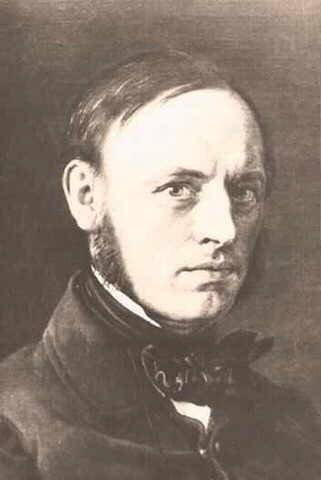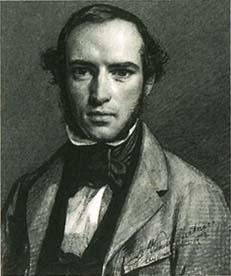<Back to Index>
- Mathematician Dmitri Fyodorovich Egorov, 1869
- Writer Johan Sebastian Cammermeyer Welhaven, 1807
- Emperor of Japan Antoku, 1178
PAGE SPONSOR


Johan Sebastian Cammermeyer Welhaven (22 December 1807 – 21 October 1873) was a Norwegian author, poet, critic and art theorist.
Johan Welhaven was born in Bergen, Norway, in 1807. His grandfather, Johan Andrew Welhaven (1748 – 1811) was a teacher and later assistant to the pastor at St Mary's Church (Mariakirken), which served the city's German community. The author's father, Johan Ernst Welhaven (1775 – 1828), was a pastor at St. George's Hospital, (St. Jørgens spedalskehospital), while his mother, Else Margaret Cammermeyer, was the daughter of Johan Sebastian Cammermeyer, resident chaplain of The Cross Church (Korskirken).
Johan Welhaven was the member of an accomplished family which included his sister socialite Maren Sars, the wife of theologian and biologist Michael Sars (1805 – 1869), and mother of historian, Ernst Sars (1835 – 1917), marine biologist Georg Ossian Sars (1837 – 1927) and mezzosoprano singer Eva Nansen (1858 – 1907). Johan Welhaven was himself the father of Norwegian architect Hjalmar Welhaven.
Welhaven attended Bergen Cathedral School from 1817 - 25. He first studied theology. However, after his final exams at the University of Christiania in 1827, he devoted himself to literature. In 1836 he had visited France and Germany; and in 1858 he went to Italy to study archaeology.
In 1840, he was appointed lecturer in philosophy at the Royal Frederik's University in Christiania and
delivered a series of lectures on literary subjects. He was employed in
1843 and became professor in 1846. Welhaven spent 26 years lecturing in
philosophy at the University from 1840 to 1866. His influence was
extended by his appointment as director of the Society of Arts. He died in Christiania in 1873.
Welhaven made his name as a representative of conservatism in Norwegian literature in the 19th century. As shown by an attack on Henrik Wergeland's poetry, he opposed the theories of the extreme nationalists. He desired to see Norwegian culture brought into line with that of other European countries, and he himself followed the romantic tradition, being influenced by J.L. Heiberg. He is known for his feud with Wergeland and for the poem Republikanerne ("The Republicans"). Welhaven was also romantically involved with Wergeland's younger sister Camilla Collett.
He gave an exposition of his aesthetic creed in the 1834 sonnet cycle Norges Dæmring ("The Dawn of Norway"). He published a volume of Digte ("Poems") in 1839; and in 1845 Nyere Digte ("Newer Poems"). Other poems followed in 1848, 1851 and 1859.
In the 1840s, Welhaven was a figure of the Norwegian national romanticism movement. Welhaven helped in beginning the career of Hans Gude — a romanticist painter — as it was Welhaven who first recommended that Gude should attend the Academy of Art in Düsseldorf.